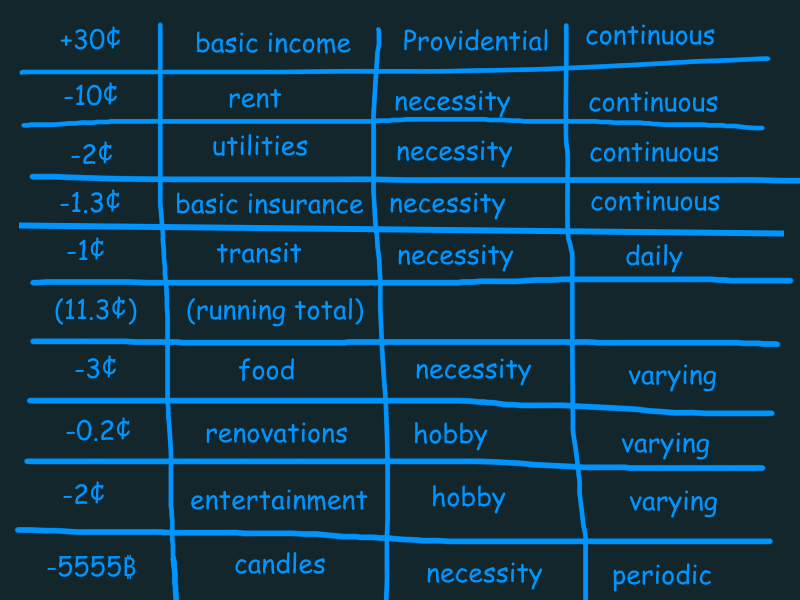Basic Income Budgeting 101
Making the Most of Your Allocation
by Measure
What is a Budget?
Welcome, fellow bit-enjoyer. A budget is an explicit plan for how to allocate resources, usually organized on a spreadsheet. For this article, we will primarily focus on the special case of bits, and in particular the case where the only source of bits you wish to rely on is your basic income provided by Providence. We will assume for simplicity that you plan to mostly reside in one location and to live independently. You may need to make adjustments if you live in a city with extra taxes (or, alternatively, in a city which tosses out lots of incentives for desired behavior.)
Your basic income will fluctuate from day to day and week to week, but a common rule of thumb is that it won't go below an average of 0.3 bits a period for more than a few days without warning. So if you keep your average periodic expenditure under half a bit, ¡you should have room to spare! (though maybe not a spare room). A properly organized budget will help you accomplish this goal.
Step 1: Know your baseline
Budgeting is easier if you understand what keeps you alive.
- Basic Living Expenses - rent, food, insurance, web access
- Transport - trains, planes, busses
- Personal Projects - art, shenanigans, schemes
- Buffer - savings, charity
Given that you're the sort to bother perusing a basic budgeting guide, I'm going to suggest you take a few bits off the responsible columns and put them towards things that make you love your life. The basic income should provide enough stability that you're unlikely to end up completely screwed over from experimenting or catgirling around a little.
If you're a chaos disaster who is only here for the love of the game (?), of course, maybe ignore that.
Step 2: Identify consistent costs
You probably want to separate out your most consistent costs, the ones that are pretty consistent each day (or maybe each week) and aren't especially discretionary. These will probably include rent, any non-packaged utilities, insurance, subscriptions, and perhaps transport. If you're the sort to use a meal plan, it might include your food.
Step 3: Track spending
After you've identified your consistent costs, you're going to want to keep track of your inconsistent costs. The best way to do this is to track all your expenditures. A week will do the trick in a pinch, but won't help you identify those expenditures which occur on the order of monthly, yearly, or sexennially. (Allocating a buffer helps account for those.)

If your discretionary spending habits up fitting within your budget, then good for you! Otherwise, you may be interested in expenditure reduction advice or getting a job.
But Meʒ! Isn't this a lot of work?
This is a very reasonable concern, and one I hope most of you have already identified. You can probably power through the initial spreadsheet setup on an energy drink if you're so inclined, but keeping track of every single purchase you make, down to the chips you tip when you like a post? Doing it by feel sounds much easier. Most people with notable income beyond the basic usually don't explicitly think about budgeting their personal expenses much at all, save for larger purchases or stuff like choosing an apartment.
Anyways, while I hope those of you who feel intrinsically motivated to do things the old fashioned way have fun, my serious recommendation is that you simply go setup BitFerret and sync it with your bank account. It's cute and will do the trick.

